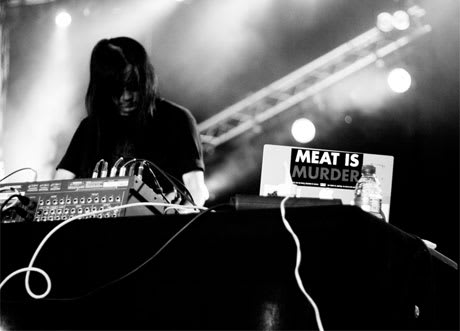Merzbow's namesake, German artist Kurt Schwitters's Merzbau installation, may at first appear to have little in common with the music. Watching a Merzbow performance, the links become more apparent: the 1920s Dadaist installation resulted in deconstruction of the artist's studio, while during a Merzbow set, it feels as though the building is deconstructing. Set in a dinner-theatre-like space at Moncton, NB's annual RE:FLUX Festival of Music and Sound Art, earplugs were provided on the tables, and staff repeatedly encouraged the audience to use them.
The legendary Japanese noise artist born Masami Akita entered silently and stoically, starting the set abruptly and ending it just as suddenly. Merzbow began with a bleeping sound that became a sort of bass line, or perhaps melody, as more abrasive white noise entered in. A few heart-stopping thuds shook the room. He played off a metal guitar with no head or neck that generated only feedback. The sound became largely a wall of staticky noise, and midway through the hour-long set, the noise became more layered and complex.
In contrast to the static, degrading wave sounds felt almost friendly. The music absorbed the audience; it felt as though the sound was expanding logarithmically as it drew the listener in. It was hard to tell how much was improvised, though Merzbow had a set list of sorts onstage. When he finished, the room echoed with noise for several minutes before concertgoers could work up the nerve to speak to each other again.
The nihilism of Akita's music is echoed in his stage persona, or lack thereof: there are no introductions, pauses or stage banter -- only the music. He walks on, works diligently at his mixers, laptop and instruments, and walks off. It's one thing to listen to Merzbow annihilate your stereo, but the full power, and obliteration, of the music is truly unleashed in his live show.
The legendary Japanese noise artist born Masami Akita entered silently and stoically, starting the set abruptly and ending it just as suddenly. Merzbow began with a bleeping sound that became a sort of bass line, or perhaps melody, as more abrasive white noise entered in. A few heart-stopping thuds shook the room. He played off a metal guitar with no head or neck that generated only feedback. The sound became largely a wall of staticky noise, and midway through the hour-long set, the noise became more layered and complex.
In contrast to the static, degrading wave sounds felt almost friendly. The music absorbed the audience; it felt as though the sound was expanding logarithmically as it drew the listener in. It was hard to tell how much was improvised, though Merzbow had a set list of sorts onstage. When he finished, the room echoed with noise for several minutes before concertgoers could work up the nerve to speak to each other again.
The nihilism of Akita's music is echoed in his stage persona, or lack thereof: there are no introductions, pauses or stage banter -- only the music. He walks on, works diligently at his mixers, laptop and instruments, and walks off. It's one thing to listen to Merzbow annihilate your stereo, but the full power, and obliteration, of the music is truly unleashed in his live show.
